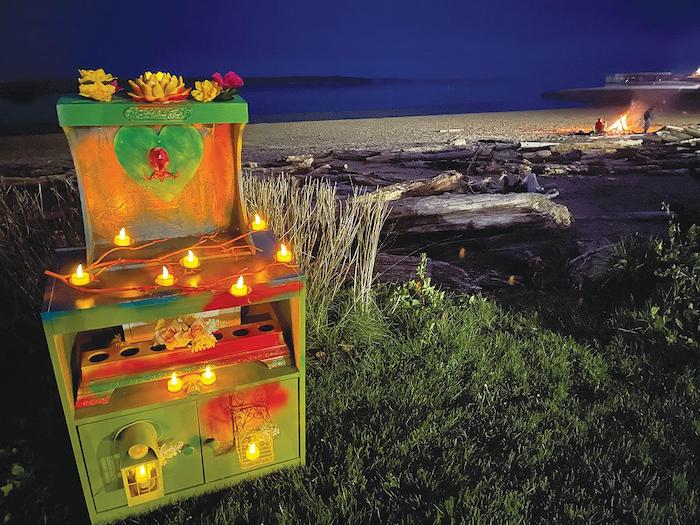
By Mathew Brock
Some people may regret not being able to say something to a loved one before they passed, but for the next month, residents and visitors to Lincoln City will have the chance to put those words into one final letter, even if it’s only symbolically.

At parks around Lincoln City, several altars appeared last month as part of the Last Word’s Mailbox Altars Public Art Installation, which gives people who have experienced the death of a loved one a place to grieve and cope by writing them letters.
The project serves another purpose however, as the letters left at the alters will be taken and turned into songs that will be performed at a virtual concert in August and sold as an album to help raise money in support of houseless veterans facing terminal illness through the Do Good Multnomah nonprofit group.
“These art installations are part of an interdisciplinary project that’s really a fundraiser,” said Crystal Akins, founder of Activate Arts and the artist responsible for the project. “I knew I could have done a regular fundraiser, like an event where you get wine and do the whole thing, but instead I wanted to do something that would bring the community together around death using their own grief and loss to transform that into a way to support a person in dying a good death.”
The project has been years in the making and was inspired by Akins’ work as a death doula, someone who helps the dying and their friends and family cope with death.
“It’s a long-term project, and I’ve been working on it for about five years so far,” Akins said. “I’ve been researching houseless death and am a death doula. I’ve been working with a lot of people who live in poverty and seeing how they die. I decided now it’s time to help build a community around death and to help veterans in poverty get access to a good death.”
Akins said the project was also inspired by the Telephone in the Wind art project, which first started in Japan with similar installations popping up in the U.S. and other countries since it debuted in 2011. At these installations, visitors can use a secluded phone booth to symbolically have one final conversation with a deceased loved one as a way to help cope with the loss.
“I saw that and the ways people were connecting with it and wanted to bring something similar here to try that would help bring community together,” Akins said. “Some of the letters I’ve been getting so far have taken the time to thank me for providing this space, and that was the purpose of this, to provide a space for people to experience grief and loss, which is especially important during this pandemic with people facing loss every day.”
The alters themselves were made by Akins using a “found art” art style, which takes discarded and recycled items and repurposes them as a medium for artwork. They’re currently located at Josephine Young Memorial Park, Siletz Bay Park and Nesika Park in Lincoln City until July 1, when Akins will collect and store them.
Those wishing to participate in the project can visit any of the altars and leave a letter, and if they like, a small offering as well, such as a flower, photo or rock. Those writing letters are asked to keep their own privacy in mind and to address letters without specific names, such as “Dear Dad,” “Dear Grandmother,” “Dear sister,” or “Dear Pet Companion.”
Complete Article ↪HERE↩!
